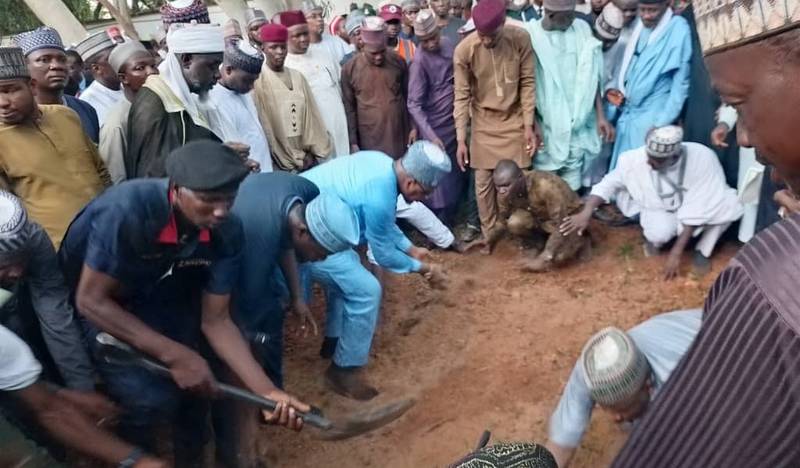
Nigerians Bid Farewell as ex-President Buhari is Laid to Rest in Daura
Nigerians Bid Farewell as ex-President Buhari is Laid to Rest in Daura
A solemn gathering of Nigeria’s most prominent leaders, dignitaries, and citizens filled the streets of Daura on Tuesday evening to pay their final respects to former President Muhammadu Buhari, who passed away at 82 in a London hospital.
The late leader, a retired general and two-time head of state, was buried in the courtyard of his private residence at 5:50 p.m., with Islamic rites and full military honors.
The ceremony blended religious prayers, military tributes, and quiet reflection as Nigeria honored a man whose legacy remains deeply etched in the nation’s political history.
Wrapped in Nigeria’s green-white-green flag before being shrouded in a white Islamic likaf, Buhari’s body was laid to rest before a grieving assembly of family members, political allies, and distinguished guests.
The atmosphere in Daura—an agrarian town in Katsina State and the birthplace of the leader famously nicknamed “Mai Gaskiya” (The Honest One)—was thick with sorrow.
Among the high-profile mourners were his widow, Aisha Buhari; President Bola Ahmed Tinubu; Vice President Kashim Shettima; former Vice President Yemi Osinbajo; and former political rival Atiku Abubakar.
Also present were business tycoon Aliko Dangote, serving and former governors, federal lawmakers, ministers, and traditional and religious leaders.
President Tinubu had earlier received Buhari’s remains at the Umaru Musa Yar’Adua Airport in Katsina after they were flown from London, where the former leader succumbed to a prolonged illness on July 13.
Born on December 17, 1942, Buhari first governed Nigeria as a military leader from 1984 to 1985. Decades later, he made history by winning a democratic election in 2015, becoming the first Nigerian to unseat an incumbent president. His combined tenure—spanning nearly a decade—cemented his place as one of Nigeria’s longest-serving leaders.
Known for his austere lifestyle, anti-corruption crusade, and War Against Indiscipline, Buhari was both revered and debated. Supporters lauded his firm stance against graft, while critics questioned his policies. Yet, his funeral became a rare unifying moment, with the Federal Government declaring a national holiday and a seven-day mourning period. Flags flew at half-mast across Nigeria and at diplomatic missions worldwide.
“Buhari’s chapter has closed, but his place in history is secure,” remarked a government official at the burial.
Fulfilling his final wish, Buhari was laid to rest in his family compound rather than a national mausoleum—a testament to his lifelong humility. For the people of Daura, he was not just a statesman but a beloved kinsman, a symbol of pride whose journey from a military cadet to Nigeria’s highest office inspired many.
As the last rites were performed and the sun set over Daura, prayers echoed for his eternal rest. Whether celebrated or critiqued, Muhammadu Buhari’s legacy in Nigeria’s political landscape remains indelible.
“May Almighty Allah grant him Aljannah Firdaus,” a cleric prayed, marking the end of an era for a man who once steered the destiny of a nation.
